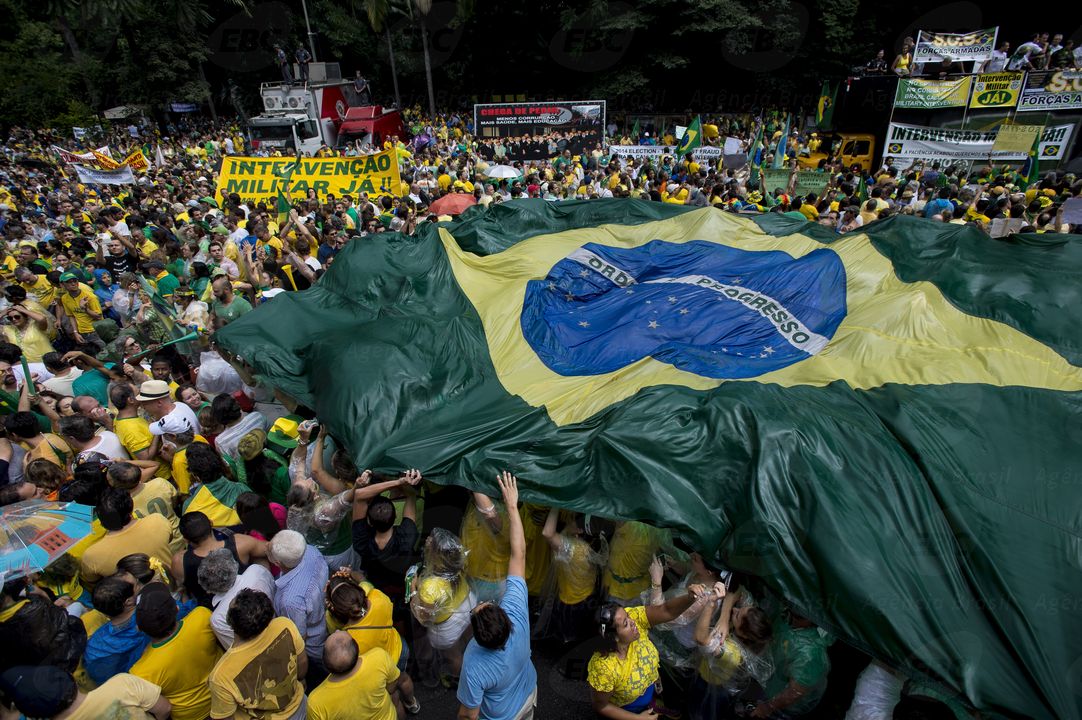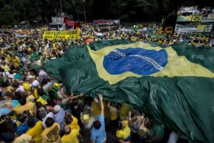The most crowded rally went on Sunday through the streets of Brazil’s economic capital São Paulo. According to Datafolha agency’s estimates, it was attended by about 500 thousand people, and the city police said that they were almost three times as much. Around 1 million people took to the streets of Rio de Janeiro. In total, according to estimates of the Brazilian police, marches and rallies on Sunday was attended by about 200 residents of cities and towns of the country. All the rallies were peaceful. Many participants wore clothing colors of the national flag of Brazil, sang songs, texts of which also contained calls for President’s resignation. The total number of participants reached about 3 million, a record for Brazil. Over the past year, crowded protests in the country have been held regularly against the backdrop of a weak economy, and the deepening scandal over corruption among the Brazilian leadership.
Political analysts say that the growing wave of protests is increasingly endangering the future of Brazilian President Dilma Rousseff. From the very beginning of a corruption scandal in the country's leadership, the name of Ms. Rousseff has been constantly popping up in connection with one or another high-ranking official in the government, implicated in corrupt dealings. Above that, the corruption scandal around the biggest oil company Petrobras also played its part. July last year, Ms. Rousseff had suffered a serious blow on her reputation due to initiation of a case on suspicion of corruption against the former President of Brazil, Luiz Inácio Lula da Silva. Dilma Rousseff was his successor and protégé. In early March, the previous president was arrested on charges of corruption. Last Wednesday, Mr. da Silva was formally charged with money laundering and concealing information about his assets. This forced current President to hold a press conference on Friday, where she reiterated that she would not resign. According to her, one cannot demand resignation of President elected by lawful means, if there is no evidence of a breach of the constitution.
The aforementioned developments have triggered crowded protests in different cities of the country. At the end of Sunday, President Rousseff hastened to make a statement: "Peaceful nature of today's demonstration shows maturity of the society that knows how different opinions can coexist alongside, and knows how to achieve respect for its laws and institutions." So far, observers have found it difficult to say whether these statements will help Ms. Rousseff. Opinion polls show that more than half of Brazilians support impeachment of President, who was elected to a second term in 2014. Recall that the Brazilian parliament began impeachment proceedings against Dilma Rousseff in December last year, supporting by requirements of the country's opposition. However, a vote on impeachment in Congress is yet to be held this year, and the situation in the country, public opinion and the corruption investigation of the facts will be key factors in the voting.
source: cnbc.com
Political analysts say that the growing wave of protests is increasingly endangering the future of Brazilian President Dilma Rousseff. From the very beginning of a corruption scandal in the country's leadership, the name of Ms. Rousseff has been constantly popping up in connection with one or another high-ranking official in the government, implicated in corrupt dealings. Above that, the corruption scandal around the biggest oil company Petrobras also played its part. July last year, Ms. Rousseff had suffered a serious blow on her reputation due to initiation of a case on suspicion of corruption against the former President of Brazil, Luiz Inácio Lula da Silva. Dilma Rousseff was his successor and protégé. In early March, the previous president was arrested on charges of corruption. Last Wednesday, Mr. da Silva was formally charged with money laundering and concealing information about his assets. This forced current President to hold a press conference on Friday, where she reiterated that she would not resign. According to her, one cannot demand resignation of President elected by lawful means, if there is no evidence of a breach of the constitution.
The aforementioned developments have triggered crowded protests in different cities of the country. At the end of Sunday, President Rousseff hastened to make a statement: "Peaceful nature of today's demonstration shows maturity of the society that knows how different opinions can coexist alongside, and knows how to achieve respect for its laws and institutions." So far, observers have found it difficult to say whether these statements will help Ms. Rousseff. Opinion polls show that more than half of Brazilians support impeachment of President, who was elected to a second term in 2014. Recall that the Brazilian parliament began impeachment proceedings against Dilma Rousseff in December last year, supporting by requirements of the country's opposition. However, a vote on impeachment in Congress is yet to be held this year, and the situation in the country, public opinion and the corruption investigation of the facts will be key factors in the voting.
source: cnbc.com



















